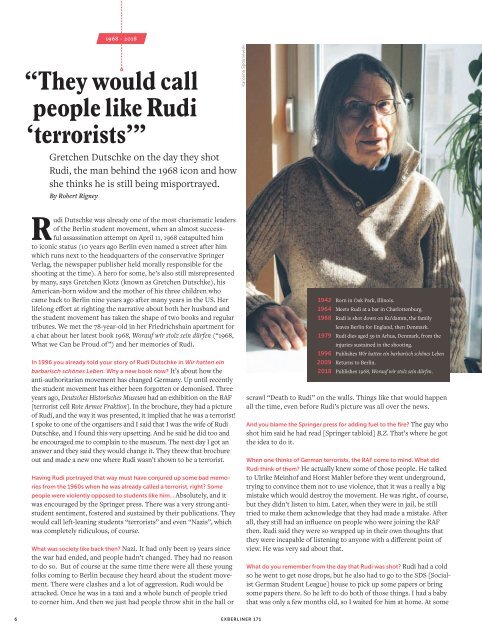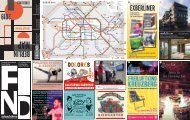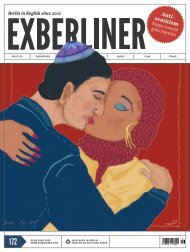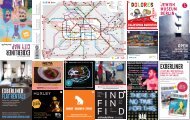You also want an ePaper? Increase the reach of your titles
YUMPU automatically turns print PDFs into web optimized ePapers that Google loves.
1968 - <strong>2018</strong><br />
“They would call<br />
people like Rudi<br />
‘terrorists’”<br />
Gretchen Dutschke on the day they shot<br />
Rudi, the man behind the 1968 icon and how<br />
she thinks he is still being misportrayed.<br />
By Robert Rigney<br />
Karolina Spolniewski<br />
Rudi Dutschke was already one of the most charismatic leaders<br />
of the Berlin student movement, when an almost successful<br />
assassination attempt on April 11, 1968 catapulted him<br />
to iconic status (10 years ago Berlin even named a street after him<br />
which runs next to the headquarters of the conservative Springer<br />
Verlag, the newspaper publisher held morally responsible for the<br />
shooting at the time). A hero for some, he’s also still misrepresented<br />
by many, says Gretchen Klotz (known as Gretchen Dutschke), his<br />
American-born widow and the mother of his three children who<br />
came back to Berlin nine years ago after many years in the US. Her<br />
lifelong effort at righting the narrative about both her husband and<br />
the student movement has taken the shape of two books and regular<br />
tributes. We met the 78-year-old in her Friedrichshain apartment for<br />
a chat about her latest book 1968, Worauf wir stolz sein dürfen (“1968,<br />
What we Can be Proud of”) and her memories of Rudi.<br />
In 1996 you already told your story of Rudi Dutschke in Wir hatten ein<br />
barbarisch schönes Leben. Why a new book now? It’s about how the<br />
anti-authoritarian movement has changed Germany. Up until recently<br />
the student movement has either been forgotten or demonised. Three<br />
years ago, Deutsches Historisches Museum had an exhibition on the RAF<br />
[terrorist cell Rote Armee Fraktion]. In the brochure, they had a picture<br />
of Rudi, and the way it was presented, it implied that he was a terrorist!<br />
I spoke to one of the organisers and I said that I was the wife of Rudi<br />
Dutschke, and I found this very upsetting. And he said he did too and<br />
he encouraged me to complain to the museum. The next day I got an<br />
answer and they said they would change it. They threw that brochure<br />
out and made a new one where Rudi wasn’t shown to be a terrorist.<br />
Having Rudi portrayed that way must have conjured up some bad memories<br />
from the 1960s when he was already called a terrorist, right? Some<br />
people were violently opposed to students like him... Absolutely, and it<br />
was encouraged by the Springer press. There was a very strong antistudent<br />
sentiment, fostered and sustained by their publications. They<br />
would call left-leaning students “terrorists” and even “Nazis”, which<br />
was completely ridiculous, of course.<br />
What was society like back then? Nazi. It had only been 19 years since<br />
the war had ended, and people hadn’t changed. They had no reason<br />
to do so. But of course at the same time there were all these young<br />
folks coming to Berlin because they heard about the student movement.<br />
There were clashes and a lot of aggression. Rudi would be<br />
attacked. Once he was in a taxi and a whole bunch of people tried<br />
to corner him. And then we just had people throw shit in the hall or<br />
1942 Born in Oak Park, Illinois.<br />
1964 Meets Rudi at a bar in Charlottenburg.<br />
1968 Rudi is shot down on Ku’damm, the family<br />
leaves Berlin for England, then Denmark.<br />
1979 Rudi dies aged 39 in Arhus, Denmark, from the<br />
injuries sustained in the shooting.<br />
1996 Publishes Wir hatten ein barbarisch schönes Leben<br />
2009 Returns to Berlin.<br />
<strong>2018</strong> Publishes 1968, Worauf wir stolz sein dürfen.<br />
scrawl “Death to Rudi” on the walls. Things like that would happen<br />
all the time, even before Rudi’s picture was all over the news.<br />
And you blame the Springer press for adding fuel to the fire? The guy who<br />
shot him said he had read [Springer tabloid] B.Z. That’s where he got<br />
the idea to do it.<br />
When one thinks of German terrorists, the RAF come to mind. What did<br />
Rudi think of them? He actually knew some of those people. He talked<br />
to Ulrike Meinhof and Horst Mahler before they went underground,<br />
trying to convince them not to use violence, that it was a really a big<br />
mistake which would destroy the movement. He was right, of course,<br />
but they didn’t listen to him. Later, when they were in jail, he still<br />
tried to make them acknowledge that they had made a mistake. After<br />
all, they still had an influence on people who were joining the RAF<br />
then. Rudi said they were so wrapped up in their own thoughts that<br />
they were incapable of listening to anyone with a different point of<br />
view. He was very sad about that.<br />
What do you remember from the day that Rudi was shot? Rudi had a cold<br />
so he went to get nose drops, but he also had to go to the SDS [Socialist<br />
German Student League] house to pick up some papers or bring<br />
some papers there. So he left to do both of those things. I had a baby<br />
that was only a few months old, so I waited for him at home. At some<br />
6<br />
EXBERLINER <strong>171</strong>

















